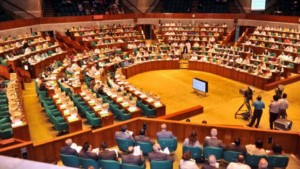Dhaka – Finance Minister AMA Muhith Thursday rolled out a Taka 340,605 crore deficit budget for 2016-2017 fiscal setting the GDP growth target at 7.2 percent and delineating a set of programmes to transform the country into a modern and welfare state by 2041.
Revenue collection targets show additional tax of little over 28,000 crore over the curren year’s original estimates, and over 55,000 crore more than the revised tax collection estimates.“We have already identified the challenges to the country’s progress and now the most important task is to put in place pragmatic programmes to meet these challenges,” he said placing the proposed budget in Parliament.
He said the programmes were drawn out in the proposed budget to reach a “higher growth trajectory” in his 126-page budget speech names “Marching towards Growth, Development and Equitable Society.
The budget made specified allocations for mega projects separately including two new ones Padma Bridge Raillink and Cox’s Bazar-Dohazari-Ramu-Ghumdhum Railway projects expanding the list of such projects to 10.
The minister also proposed expansion of the number of beneficiaries of old age allowances saying from the coming fiscal 31.50 lakh elderly people would come under the safety net programme getting Taka 500 monthly instead of previous per head allocation of Taka 400.
Muhith placed the 3rd budget of Awami League government that assumed to power for a second consecutive term after January 5, 2014 polls.
The proposed budget set an Annual Development Programme (ADP) with the original outlay of Taka 1,10,700 crore, an amount which is up by Taka 16,806 crore or 18 percent from the current fiscal’s revised budget of Taka 93894 crore. The ADB outlay appeared fat since last year with the earnings of the state-owned corporations and autonomous bodies in the national budget.
According to the budget documents, the ADP outlay would stand at Taka 1,23,345.80 crore in the coming fiscal with an amount of Taka 12,645.80 crore coming from the earnings of the corporations and autonomous organizations. The finance minister has set GDP target at 7.2 percent for FY17, up from the current fiscal’s target of 7 percent while the inflation target has been set at 5.8 percent against the outgoing fiscal’s 6.2 percent.
The overall budget deficit will be Taka 97,853 crore which is 5.0 percent of GDP. Of the amount Taka 36,305 crore will be financed from the external sources and Taka 61,548 crore from the domestic sources and of domestic financing, Taka 38,938 crore will come from the banking system and Taka 22,610 crore from savings certificates and other non-banking sources.
A total of Tk. 2,23,578 crore has been allocated for non-development and other expenditures. The revenue receipts for FY17 have been estimated at Taka 2,42,752 crore which is 12.4 percent of GDP. NBR tax revenue is estimated at Tk. 2,03,152 crore and the non-tax revenue collection target has been set at Taka 32,350 crore.
Muhith sees a significant increase in VAT collection. Besides, the ongoing reform programmes of automation, curtailing tax exemption facility, extension of tax administration, widening tax net and tax base etc. will be further strengthened, he said.
According the proposed ADP outlay, the highest 25.8 percent allocation was suggested for the overall communication infrastructures incorporating several mega projects. While elaborating the ADP, Muhith said 24.6 percent of development outlay will go to the human resource sectors like education and health, 24.5 percent to overall agricultural and rural economy covering also the rural institutions, water resources, 13.5 percent to power and energy sector, and 11.6 percent to other sectors.
The minister said despite many obstacles the country’s “economy grew and attained a stature with least volatility”. “The country has stepped on the stairway to development and this is an appropriate moment to take up a broad-based action agenda alongside strengthening the ongoing initiatives to reach a higher growth trajectory,” Muhith said.
Muhith identified the current period to be the “right time to reap the benefits of demographic dividend from an ever-growing young population bubbling with energy”.




